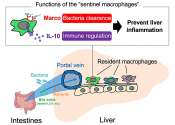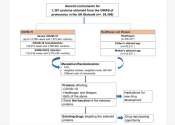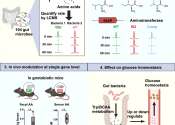Last update:
Gastroenterology news
Pediatrics
Racial disparities found to exist in emergency department treatment of children with unintentional ingestions
Unintentional injuries like falls, drownings and poisonings are the leading cause of death in patients ages 1–4, and a significant portion of these deaths are linked to unintentional ingestion—such as swallowing a drug ...
5 hours ago
0
0
Organoids derived from gut stem cells reveal two distinct molecular subtypes of Crohn's disease
Crohn's disease—an autoimmune disorder—is characterized by chronic inflammation of the digestive tract, resulting in a slew of debilitating gastrointestinal symptoms that vary from patient to patient. Complications of ...
16 hours ago
0
28

Phase II results suggest targeted therapy is effective for moderate to severe ulcerative colitis
An international placebo-controlled study led by Cedars-Sinai suggests that a targeted drug therapy that was developed by researchers at Cedars-Sinai is safe and effective at helping people with moderate to severe ulcerative ...
18 hours ago
0
16

Q&A: Study identifies potential new treatment for liver fibrosis
New research from the University of Pittsburgh School of Pharmacy sheds light on the processes that lead to liver fibrosis and suggests a novel treatment approach for this common and serious condition.
Sep 25, 2024
0
0

Campylobacter jejuni-specific antibody gives hope to vaccine development
Bacterial infections resulting in enteritis, and sometimes extra-intestinal infections such as sepsis, continue to be a global health concern. A leading cause of diarrheal and extra-intestinal infectious mortality among children ...
Sep 25, 2024
0
8

Blueberry-derived compound shows promise in enhancing colonic mucosal barrier function
A research team from Shenyang Agricultural University, led by Dr. Bin Li, has highlighted the potential of malvidin-3-O-galactoside (M3G), a blueberry-derived anthocyanin, to improve colonic mucosal barrier function and alleviate ...
Sep 25, 2024
0
0

Study reveals link between microbiome and aggression in mice
A new study led by Prof. Omry Koren and graduate student Atara Uzan-Yuzari from the Azrieli Faculty of Medicine at Bar-Ilan University has unveiled significant evidence connecting the gut microbiome to aggressive behavior ...
Sep 23, 2024
0
3

Study: Referral to hepatology is lower in patients with excessive alcohol use who have mental health disorders
People with alcohol use disorder (AUD) who are at risk of advanced liver disease are less likely to be referred for liver evaluation and care if they present primarily with alcohol-related mental health issues or a mental ...
Sep 23, 2024
0
0

Paternal gut health may affect the physical and mental health of offspring
Florey researchers have shown, for the first time, that a father's gut health plays a role in offspring physiology and behavior.
Sep 23, 2024
0
0

'Transient' gut bacteria may affect health and guide diet choices
Scientists have identified two types of microbes in the gut using data from a year-long study of the same patients and suggest that labeling both helpful and harmful gut bacteria could make treatment easier.
Sep 20, 2024
0
66

Study: Naldemedine prevents opioid-induced constipation in patients with cancer
Opioids, potent pain relievers for patients with cancer, frequently cause constipation, which is a significant issue. Researchers at University of Tsukuba revealed that administering naldemedine, which is a constipation medication, ...
Sep 19, 2024
0
0

Non-invasive method can help predict survival in patients with liver cancer
Hepatocellular carcinoma or HCC is the most commonly observed form of liver cancer and the fourth leading cause of cancer-related death worldwide. For patients with an advanced form of HCC, there are different types of systemic ...
Sep 19, 2024
0
0

Scientists discover proteins in meat, milk and other foods suppress gut tumors
Researchers led by Hiroshi Ohno at the RIKEN Center for Integrative medical sciences (IMS) in Japan have discovered that food antigens like milk proteins help keep tumors from growing in our guts, specifically the small intestines. ...
Sep 18, 2024
0
185

Could your phone detect hepatic encephalopathy by listening to you read?
Research from the University of Michigan suggests that one day a phone app could be able to detect the development of hepatic encephalopathy in patients just by listening to them speak.
Sep 18, 2024
0
0

Model can predict, stratify liver cancer risk in noncirrhotic chronic hepatitis B
A new prognostic model can predict and stratify hepatocellular carcinoma (HCC) risk in noncirrhotic adult patients with chronic hepatitis B (CHB), according to a study published online Sept. 17 in the Annals of Internal Medicine.
Sep 18, 2024
0
0

How AI can help researchers make esophageal cancer less deadly
Approximately 600 times a day, the esophagus ferries whatever is in your mouth down to your stomach. It's usually a one-way route, but sometimes acid escapes the stomach and travels back up. That can damage the cells lining ...
Sep 18, 2024
0
27

Humor could help people engage with colorectal cancer information, study suggests
Colorectal cancer (CRC) is no laughing matter. It's the second-leading cause of cancer deaths globally, according to the World Health Organization. But new research led by the University at Buffalo suggests that humor can ...
Sep 18, 2024
0
0

Video: What is the microbiome?
Valhalla Fellow Lindsey Backman explains what the microbiome is and the roles that different members of our microbiomes play in health and disease.
Sep 18, 2024
0
1

Gut-brain axis shift is needed in depression research, experts say
Scientists have high-tech tools to understand the biological factors that underly depression—from gut bacteria to genetics. But they have yet to be integrated in an effective manner, according to leading researchers.
Sep 18, 2024
0
0

Evidence of inverse relationship between incidence of Alzheimer's disease and colorectal cancer
A team of epidemiologists at the First Hospital of Hebei Medical University, in China, has shown experimental evidence of an inverse relationship between incidences of Alzheimer's disease and colorectal cancer.

Cutting out sugar and starch is as effective for IBS as current recommendations: Study
Symptoms for patients with the gastrointestinal disease IBS improved as much by eating less sugar and starch as for those who followed FODMAP—the diet currently recommended to patients. The results, presented in a new study ...
Sep 17, 2024
0
1

FDA approves Tremfya for ulcerative colitis
The U.S. Food and Drug Administration has approved Johnson & Johnson's Tremfya (guselkumab) for the treatment of adults with moderately to severely active ulcerative colitis.
Sep 17, 2024
0
0

Global trial ends 20-year debate over gastro-esophageal cancer treatment
Cancer patients could avoid unnecessary radiation therapy as a result of an international clinical trial, led by Peter Mac researcher Prof Trevor Leong. The TOPGEAR study demonstrated that radiotherapy does not improve survival ...
Sep 16, 2024
0
10

High-dose vitamin D3 does not provide benefit for metastatic colorectal cancer, clinical trial shows
SOLARIS (Alliance A021703), a multicenter, double-blind, randomized Phase III clinical trial led by Dana-Farber Cancer Institute researchers and conducted across several hundred cancer centers in the U.S. tested the addition ...
Sep 16, 2024
0
0













































